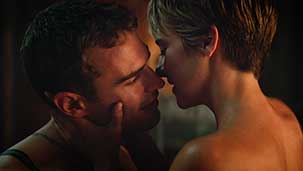Dear LGBT Community,
I’m not sure how I missed it the first time.
When I saw Divergent a few weeks ago, it struck me as just another dystopian teen picture with a human-race-divide-by-faction premise (after three Hunger Games films, The Maze Runner, The Giver, et al). The real-world parallel felt akin to teens choosing a major in university – divergents being the “dangerous” equivalent to undeclared students. The one thing that did stand out for me was how, for once, there wasn’t a love triangle used to hold the whole thing together.
I know. I’m so naïve.
Suddenly, along comes Insurgent. A little more confident, a little more forthright, but really, the haircut gave it away. The Divergent Series is about experimenting in college – but not with classes.
Sure, Shailene Woodley’s distracting new ‘docould mean any number of things, from the deeply emotional to purely practical. But for me, it was a deafening dog whistle that the filmmakers were ready to come out with a more pointed message for anyone willing to listen. The character of Triss isn’t really looking for a faction, she’s looking for a letter to claim in the ever growing LGBT banner.
To recap, the Divergent Series takes place in a world where characters take an elaborate aptitude test to determine what group their personality is best suited for – be it Abnegation (the selfless), Erudite (the intelligent), Dauntless (the brave), Aminity (the peaceful) or Candor (the honest). The test will tell you what lifestyle you “should” choose, but ultimately the decision rests with the individual. Those who don’t fit in anywhere become Factionless (and shunned). Those who fit in everywhere are considered Divergent (and a threat to the entire label-heavy system). Triss, of course, is Divergent – compatible with every faction, but drawn to one for reasons she can’t explain.
In other words, Triss is treated like a Pansexual. And “P’s” don’t exactly fit the mainstream understanding of the LGBT label, therefore they need to be discarded. How can someone can be attracted to any gender identity, right? Yet at the same time, their molecular rejection of gender binaries could also unlock our entire understanding of human nature.
To drive the point home, the scientific leader of this world develops a system that rates where an individual lands on the divergent scale. Triss is a perfect 100. Most people land in the 40s and aren't worth the time of day. Alfred Kinsey would be proud.
Through this lens, it’s hard not to see the phallic machines that send Triss into convulsions as equivalent to the eletro-shock therapy of the 1950s and 1960s that sent perfectly healthy queer people into personal hell. Even the guns used by the Erudite soldiers (read: the straight establishment) are closer to tranquilizers, simulating a chemical castration that deprives people of their true identity.
The language throughout the series is also consistent with a teen coming out of the closet. Triss literally imagines herself saving her mother from a flaming home (her mother was also Divergent) and breaking through glass walls that divide her from her family. Most pointedly, her brother represents heteronormative standards, where one can almost too easily chose a label and feel threatened by those who don’t.
The Divergent Series’ central metaphor of not fitting in will no doubt strike a chord with all sorts of teens, but I’m happy to see the series itself is finally getting more comfortable in its own skin.
Sincerely,

Christopher







